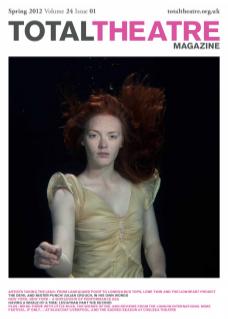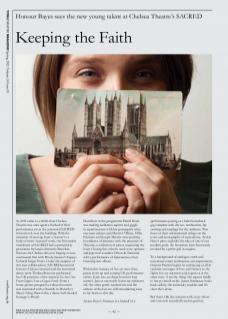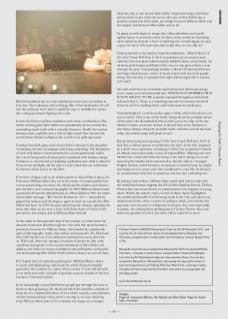As 2011 came to a chilly close Chelsea Theatre was once again a hotbed of fiery performance art as the renowned SACRED festival took over the building. With the intention of moving from a ‘season’ to a body of more ‘seasonal’ work, the November instalment of SACRED had a particularly passionate feel and a distinctly Brazilian flavour, the Chelsea this year forging a crosscontinental link with Rio de Janeiro’s Espaço Cultural Sérgio Porto. Under the auspices of this new collaboration, SACRED perennial Gustavo Ciríaco returned and the renowned dance artist Thelma Bonavita performed her UK premiere of the satirical Eu Sou Uma Fruta Gogoia (I am a Gogoia Fruit). From a home-grown perspective cultural tourism was examined with a flourish in Dorothy’s Shoes’ Flying Down to Rio, a dance hall themed homage to Brazil.
Elsewhere in the programme David Hoyle was making audiences squirm and giggle in equal measure with his grotesquely witty one-man cabaret and Martin O’Brien, Gillie Kleiman and Joseph Mercier were pushing boundaries of intimacy with the premiere of Threesome, a collection of pieces examining the body. Closing this eclectic week were operatic and pop-noir wonders Othon & Tomasini with a performance of Impermanence, their haunting new album.
Within this furnace of live art were three pieces from up and coming UK performance artists. Each was an object lesson in heat control. Just as one nearly burnt my eyebrows off, the other gently warmed me and the embers of the last are still smouldering away in my brain to this day.
Action Hero’s Frontman is a fireball of a performance posing as a faded comeback gig complete with dry ice, tambourine, lip syncing and earplugs for the audience. Part three of their unintentional trilogy on the icons and iconography of masculinity, Action Hero’s piece explodes the idea of one of our modern gods, the frontman, here ferociously invoked by a petite girl in sequins.
To a background of analogue synth and occasional errant tambourine accompaniment, Gemma Paintin begins by embracing us all in sardonic messages of love and flattery as she fights for our attention and expects it at the same time. ‘I am the thing’ she repeats baldly to her po-faced techie. James Stenhouse looks back sulkily, the animosity crackles and it’s clear she’s alone.
But that’s OK she screams with every shiver and viciously mouthed lyrical repetition. Paintin’s bombast acts as a suit making her seem vast, a leviathan at four feet. She is glorious and terrifying. Bits of her tambourine fly off into the audience and I have to quell the urge to scrabble for a piece like a religious fanatic fighting for a relic.
It can’t last forever and her exaltation soon turns to exhaustion. Her techie wearing giant pink rabbit ears sporadically moves around her, unwinding music cords with a comedic slowness. Finally the tension between them explodes into a full on fight which flies out into the crowd before Paintin collapses into a wall of ear splitting sound.
Frontman forcefully plays with Action Hero’s interest in the absurdity of standing in front of strangers and doing something. The idolisation of such rock deities is both presented to us and questioned, whilst the cost of being such a human god is examined with fearless energy. Frontman is a visceral and ear popping exploration into what is asked of those in the spotlight and the epic no man’s land that can sometimes lie between them and us in the dark.
If notions of legacy run as an undercurrent in Action Hero’s piece, for Francesca Millican-Slater they are at the centre of a much gentler but no less penetrating solo show. Me, Myself and Miss Gibbs is part lecture, part detective story and part biography. In 2003 Millican-Slater found a postcard of Lincoln cathedral sent to a Miss Gibbs in 1910. Its rather doom-laden message – ‘Be Careful Tomorrow. A.C.’ – immediately piqued her interest and she began a quest to find out exactly who Miss Gibbs had been. In 2010 she again picked up the threads, updating the show into what we see now, a story with three layers of history both personal to her subject and to Millican-Slater herself.
As she takes us through each step of her journey, it is clear from the amount of emotion laced through her voice that this quest became a personal obsession for Millican-Slater. Surrounded by a patchwork quilt of photographs, maps, train tickets and postcards, Me, Myself and Miss Gibbs has the air of an enthusiast sharing their secret den with us. With each discovery springs a fountain of questions. She visits a medium and speaks to the current inhabitant of Miss Gibbs’ old address; she finds out stories of adoption and suffragettes and quietly sets about placing Miss Gibbs firmly within a history we can all share.
If it sounds twee it’s actually anything but. Millican-Slater’s down to earth, self-deprecating style keeps the whole thing thoroughly grounded. She watches the videos of her earnest 21 year-old self with a wry smile and with a twinkle of genuine concern wonders if she has become a ‘historical stalker’.
In an increasingly cynical field where people pay through the nose to find out their genealogy Me, Myself and Miss Gibbs feels like a breath of fresh air. It’s a haphazard labour of love which unearths and celebrates another human being’s story, and it’s moving to see how much leg work Millican-Slater puts in for a woman who began as a stranger. Near the end, as she reveals Miss Gibbs’ original marriage certificate and we find out just what she was to take care of that fateful day, a genuine connection feels made, not simply between Millican-Slater and her subject, but between Miss Gibbs and us all.
As paper records begin to merge into online databases and emails replace letters it seems the traces we leave on the world are becoming more and more abstract. I leave wondering who would engage on such a quest for me in 100 years time and would they even be able to?
From postcards to the dead to funeral soundtracks... Brian Lobel’s Or Else Your Friends Will Have To Do It (a performance for you and your music collection) is the last piece which remains indelibly burnt on my brain. An intimate performance publication this one-on-one piece comes to you through the post. Your package includes a blank CD and small brown envelope which houses a series of neatly typed cards tied with purple string. The fact that it is purple feels right and strangely like it matters very much.
On each card there are comments and instructions which encourage you to make your own memorial mix. THIS IS NOT MORBID, OR IT IS NOT MEANT TO BE is quietly repeated throughout and indeed it doesn’t feel so. There is a surprising amount of reverence involved however and I’m cradling these cards with immense tenderness.
Unsurprisingly it’s a task that takes quite a while, and Lobel advises you not to rush it. This is one of the lovely things about the portable nature of this piece; the disembodied artist is with you every step of the way whether it takes you hours or days. It doesn’t have to be finalised, it can always change and grow; possible tracks still echo around my head today. Just which songs will speak of me?
But far from being navel-gazing Or Else Your Friends Will Have To Do It feels like a selfless project to undertake; the clue’s in the title. Inspired by Lobel’s own experience of making a CD for his ex-partner’s funeral he imbues each action with a sense of responsibility. Making your own memorial is a hard and reflective thing to do, but in doing so you are removing the burden from someone else. Quietly and in a strangely English fashion, Lobel broaches no hysterics or fearful tears; he simply encourages you to create your own soundtrack to your life. In doing so he communicates that this is a precious task but also a releasing one.
By placing Action Hero, Millican-Slater and Lobel side-by-side with the established names topping the bill of their flagship festival, Chelsea Theatre has once more shown its commitment to the support of young talent. Whilst the eclectic styles of each of these shows highlighted the wealth and breadth of work being made in the UK, each piece was underscored with a drive to make its audience think, and whether the questions were shouted or whispered in all cases they were impossible to ignore. In curating three probing pieces Chelsea Theatre have laid down the gauntlet for 2012: just what will be asked of us next?
Chelsea Theatre’s SACRED Keeping the Faith ran 24-28 November 2011, and was the first of what will be a series of exchanges between Brazilian and UK artists, programmed in collaboration with the Espaço Cultural Sérgio Porto in Rio.
Alongside its performance programme Keeping the Faith incorporated Bodily Functions – the body in performance, a presentation of selected highlights from the Live Art Development Agency’s documentary library; the one-day symposium Being Seen, Being Heard, discussing the ways performance is seen and experienced; and Talking With Your Mouth Full, a sharing of ideas, thoughts and food organised by Artsadmin and aimed at young people and emerging artists.


